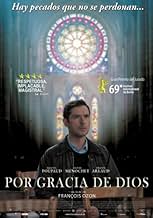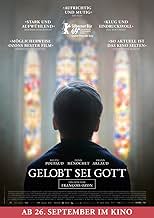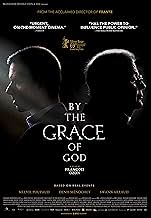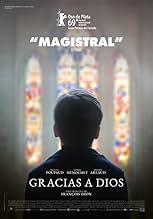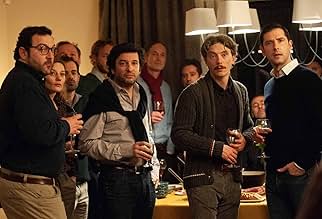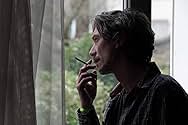IMDb RATING
7.2/10
8.4K
YOUR RATING
Three men, abused by the same priest during their childhood, engage in a fight for justice that will expose their personal experiences and question their life with their wife, family, and co... Read allThree men, abused by the same priest during their childhood, engage in a fight for justice that will expose their personal experiences and question their life with their wife, family, and colleagues.Three men, abused by the same priest during their childhood, engage in a fight for justice that will expose their personal experiences and question their life with their wife, family, and colleagues.
- Awards
- 4 wins & 20 nominations
- Director
- Writer
- All cast & crew
- Production, box office & more at IMDbPro
Storyline
Did you know
- TriviaThe movie depicting real-life events that were still on trial, Father Preynat's lawyers tried in the week before release to prevent the film from hitting cinemas, at least until the judgment and despite its Silver Bear won at the Berlin Film Festival a few days prior. They invoked the fact that Father Preynat is presumed innocent until convicted. The court decided to allow the movie to be released, arguing the priest had already pleaded guilty.
- ConnectionsReferenced in On a Magical Night (2019)
Featured review
When one thinks of contemporary French cinema, few names seem as ill-fitting for a docudrama about an ongoing real-life case involving the abuse of children by a Catholic priest than François Ozon, the prolific and formally inventive filmmaker best known for erotically-charged films such as Sitcom (1998), Swimming Pool (2003), and Young & Beautiful (2013). Originally planned as a documentary, Grâce à Dieu (By the Grace of God) is a partly-fictionalised account of the case of Fr. Bernard Preynat and the formation of La Parole Libérée (known in English as Lift the Burden of Silence), an advocacy group for victims of childhood sexual abuse. Probably Ozon's most formally conventional work, with none of his usual visual panache, the film was modelled after Tom McCarthy's exceptional Spotlight (2015), which examined the Boston Globe's 2002 investigation into sexual abuse in the Boston Archdiocese. This comparison is important insofar as it speaks to Ozon's lack of formal gymnastics; in short, as with Spotlight, the conventional style is matched to the thematic seriousness, wherein neither director wants to run the risk of elements of the form distracting from the content (not that any visual or aural trickery would help either to tell their particular story). Grâce à Dieu, however, is not a Catholic-hit job; rather it depicts the institutional dissembling and prevarication as coming not necessarily from a place of evil, but from a desire to avoid another scandal. Nonetheless, the Church as depicted very much talks a lot about forgiveness and redemption, but seems to have very little understanding of justice or punishment. It's weighty stuff, and although it courts a narrative objectivity and stylistic restraint that often suggests a void of emotion, for the most part, this is undeniably powerful cinema.
The film begins in 2014 as Alexandre Guérin (Melvil Poupaud), a respected banker and devout Catholic, discovers that Fr. Bernard Preynat (Bernard Verley), the priest who he believed to have been defrocked for sexually abusing him, is not only still a priest, but is still working with children. He contacts the Archbishop of Lyon, Cardinal Philippe Barbarin (François Marthouret), and is urged to meet with Preynat. He does so, hoping for Preynat's resignation, but although Preynat openly admits to young boys, he refuses to apologise or admit to wrong-doing publicly. When the church says it can't take the matter any further, citing the 20-year statute of limitations, Alexandre, who has raised his five children in the faith, feels compelled to act, and so, very reluctantly, he takes his story to the press. He is soon contacted by François Debord (Denis Ménochet), who also claims to have been abused by Preynat. Now an atheist, the more militant François advises marshalling the power of social media, and has formed an advocacy group which he hopes will be able to stand against the church and see Preynat not just defrocked, but criminally convicted. Soon, Alexandre and François are joined by a third man, Emmanuel Thomassin (a heart-breaking turn by Swann Arlaud), whose entire adult life has been negatively affected by his childhood.
Ozon originally planned Grâce à Dieu as a documentary, and the screenplay is based on much of his own research, including interviewing the founders of La Parole Libérée. Although the film's central trio are fictional composites, the sequence of events is closely based on real-life, whilst both Preynat and Barbarin are very real, with Preynat (who has now been defrocked, with a criminal trial pending) believed to have up to 85 boys over a thirty 30-year period, most between the ages of 9 and 12.
It's a broadly dispassionate film, and one of the results of Ozon's shunning of directorial flourishes is that there's never anything even remotely sensationalistic. However, although his flamboyant inventiveness is largely absent, the narrative structure is aesthetically interesting. Rather than telling the stories of Alexandre, François, and Emmanuel concurrently, Ozon structures the film in the style of a relay, giving the narrative over to each of them in turn. So at the end of act one, Alexandre meets François, who then takes the narrative reigns, with Alexandre largely absent from act two. François, in turn, then gives way to Emmanuel. Of course, there is overlap, and towards the end, Alexandre re-emerges as the protagonist, but what this style allows for is a slightly different story-telling technique for each man. Alexandre's act is largely epistolary, with the letters between himself and Barbarin read in voiceover. The formality of such a style nicely captures his formal relationship with the Church - he has no desire for a public scandal and believes in going through the proper channels. Once the far more bullish and theatrical François takes over, the style becomes more confrontational (at one point, Alexandre has to talk him out of hiring a plane to sky-draw a above the Cathédrale Saint-Jean-Baptiste de Lyon, one of the film's few moments of levity). Then, in the third section, which focuses on the emotionally fragile Emmanuel, the film is at its most empathetic, with the formality of the first section and the rugged directness of the second replaced with a stronger sense of humanism and emotionality. In a film noticeable for its director's formal restraint, it's a well-handled and subtle way of matching form to content without necessarily foregrounding it. This structure also lends itself to exploring the psychological specificity of each man, making for a more ruminative narrative than would have been possible via concurrent editing.
This is important because Ozon is also interested in the mechanics of healing, with all three men dealing with their experiences in different ways, which, in and of itself, reminds us that whilst we tend to think of outrages such as this with a kind of collective mentality, the actual scars of abuse are as unique as each victim is from one another. Although Alexandre found strength in his faith, he has been forced to compartmentalise ("this is about morality, not faith"), which has put him constantly on the defensive about how his actions are not intended as a form of attack against the Church, arguing "it's about justice, not revenge" and "I'm doing this for the church, not against it", as he points out that "families need to know the Church will always protect children". However, whereas Alexandre reaffirms his faith, François rejects his, arguing, "my faith is human, not Catholic hypocrisy", and whilst Alexandre urges forgiveness, François argues, "if you forgive him, you'll be his prisoner forever". For Emmanuel, the process of healing seems barely to have begun, if it ever will. However, the film is especially unequivocal in asserting that for all three men, and by extension all victims of childhood sexual abuse, the trauma will never leave them, it's a part of who they are, not necessarily the main part, but a part nonetheless, a part with which they will always wrestle, with references to how "the burden of silence is heavy to lift" and how difficult it is to "live in the shadow of what he did".
From a more critical standpoint, Ozon overuses the epistolary format in the first act. I understand why he went with this approach, as (apart from establishing Alexandre's more formal relationship with the Church) it has to lay down a lot of background. But, for me, he goes overboard - at times the first act feels less like a coherent narrative held together by the epistolary form and more like a series of letters occasionally interrupted by "on-screen" events. This creates an occasional sense of dramatic inertia that wouldn't be a problem in a non-visual medium, but which can drag a film down. The film also occasionally finds it difficult to escape its origins as a documentary, with some scenes, notwithstanding the universally superb acting, feeling more like respectful yet clinical reconstructions rather than scenes in a narrative drama hoping for a degree of emotional connection. The fact that the case is still ongoing also robs the film of a natural structure, as if the story ends before we get to what we would expect to constitute the final act, and one wonders if perhaps Ozon wouldn't have been better waiting until the conclusion of the criminal trial.
But given the overall strength of the non-intrusive direction, the brilliance of the acting, and the clearheaded portrayal of such an emotive topic, criticising Ozon for such things seems almost churlish. Less procedural than the investigative journalism-basis of Spotlight, Grâce à Dieu is no less honest or unsettling a film. It may be too controlled for some, whilst the measured pacing and hefty subject matter will undoubtedly put off others. Nevertheless, uncharacteristically solemn for Ozon, it is another important document on a subject that, sadly, seems unlikely to go away any time soon.
The film begins in 2014 as Alexandre Guérin (Melvil Poupaud), a respected banker and devout Catholic, discovers that Fr. Bernard Preynat (Bernard Verley), the priest who he believed to have been defrocked for sexually abusing him, is not only still a priest, but is still working with children. He contacts the Archbishop of Lyon, Cardinal Philippe Barbarin (François Marthouret), and is urged to meet with Preynat. He does so, hoping for Preynat's resignation, but although Preynat openly admits to young boys, he refuses to apologise or admit to wrong-doing publicly. When the church says it can't take the matter any further, citing the 20-year statute of limitations, Alexandre, who has raised his five children in the faith, feels compelled to act, and so, very reluctantly, he takes his story to the press. He is soon contacted by François Debord (Denis Ménochet), who also claims to have been abused by Preynat. Now an atheist, the more militant François advises marshalling the power of social media, and has formed an advocacy group which he hopes will be able to stand against the church and see Preynat not just defrocked, but criminally convicted. Soon, Alexandre and François are joined by a third man, Emmanuel Thomassin (a heart-breaking turn by Swann Arlaud), whose entire adult life has been negatively affected by his childhood.
Ozon originally planned Grâce à Dieu as a documentary, and the screenplay is based on much of his own research, including interviewing the founders of La Parole Libérée. Although the film's central trio are fictional composites, the sequence of events is closely based on real-life, whilst both Preynat and Barbarin are very real, with Preynat (who has now been defrocked, with a criminal trial pending) believed to have up to 85 boys over a thirty 30-year period, most between the ages of 9 and 12.
It's a broadly dispassionate film, and one of the results of Ozon's shunning of directorial flourishes is that there's never anything even remotely sensationalistic. However, although his flamboyant inventiveness is largely absent, the narrative structure is aesthetically interesting. Rather than telling the stories of Alexandre, François, and Emmanuel concurrently, Ozon structures the film in the style of a relay, giving the narrative over to each of them in turn. So at the end of act one, Alexandre meets François, who then takes the narrative reigns, with Alexandre largely absent from act two. François, in turn, then gives way to Emmanuel. Of course, there is overlap, and towards the end, Alexandre re-emerges as the protagonist, but what this style allows for is a slightly different story-telling technique for each man. Alexandre's act is largely epistolary, with the letters between himself and Barbarin read in voiceover. The formality of such a style nicely captures his formal relationship with the Church - he has no desire for a public scandal and believes in going through the proper channels. Once the far more bullish and theatrical François takes over, the style becomes more confrontational (at one point, Alexandre has to talk him out of hiring a plane to sky-draw a above the Cathédrale Saint-Jean-Baptiste de Lyon, one of the film's few moments of levity). Then, in the third section, which focuses on the emotionally fragile Emmanuel, the film is at its most empathetic, with the formality of the first section and the rugged directness of the second replaced with a stronger sense of humanism and emotionality. In a film noticeable for its director's formal restraint, it's a well-handled and subtle way of matching form to content without necessarily foregrounding it. This structure also lends itself to exploring the psychological specificity of each man, making for a more ruminative narrative than would have been possible via concurrent editing.
This is important because Ozon is also interested in the mechanics of healing, with all three men dealing with their experiences in different ways, which, in and of itself, reminds us that whilst we tend to think of outrages such as this with a kind of collective mentality, the actual scars of abuse are as unique as each victim is from one another. Although Alexandre found strength in his faith, he has been forced to compartmentalise ("this is about morality, not faith"), which has put him constantly on the defensive about how his actions are not intended as a form of attack against the Church, arguing "it's about justice, not revenge" and "I'm doing this for the church, not against it", as he points out that "families need to know the Church will always protect children". However, whereas Alexandre reaffirms his faith, François rejects his, arguing, "my faith is human, not Catholic hypocrisy", and whilst Alexandre urges forgiveness, François argues, "if you forgive him, you'll be his prisoner forever". For Emmanuel, the process of healing seems barely to have begun, if it ever will. However, the film is especially unequivocal in asserting that for all three men, and by extension all victims of childhood sexual abuse, the trauma will never leave them, it's a part of who they are, not necessarily the main part, but a part nonetheless, a part with which they will always wrestle, with references to how "the burden of silence is heavy to lift" and how difficult it is to "live in the shadow of what he did".
From a more critical standpoint, Ozon overuses the epistolary format in the first act. I understand why he went with this approach, as (apart from establishing Alexandre's more formal relationship with the Church) it has to lay down a lot of background. But, for me, he goes overboard - at times the first act feels less like a coherent narrative held together by the epistolary form and more like a series of letters occasionally interrupted by "on-screen" events. This creates an occasional sense of dramatic inertia that wouldn't be a problem in a non-visual medium, but which can drag a film down. The film also occasionally finds it difficult to escape its origins as a documentary, with some scenes, notwithstanding the universally superb acting, feeling more like respectful yet clinical reconstructions rather than scenes in a narrative drama hoping for a degree of emotional connection. The fact that the case is still ongoing also robs the film of a natural structure, as if the story ends before we get to what we would expect to constitute the final act, and one wonders if perhaps Ozon wouldn't have been better waiting until the conclusion of the criminal trial.
But given the overall strength of the non-intrusive direction, the brilliance of the acting, and the clearheaded portrayal of such an emotive topic, criticising Ozon for such things seems almost churlish. Less procedural than the investigative journalism-basis of Spotlight, Grâce à Dieu is no less honest or unsettling a film. It may be too controlled for some, whilst the measured pacing and hefty subject matter will undoubtedly put off others. Nevertheless, uncharacteristically solemn for Ozon, it is another important document on a subject that, sadly, seems unlikely to go away any time soon.
- How long is By the Grace of God?Powered by Alexa
Details
- Release date
- Countries of origin
- Official sites
- Language
- Also known as
- Por Gracia de Dios
- Filming locations
- Production companies
- See more company credits at IMDbPro
Box office
- Budget
- €6,000,000 (estimated)
- Gross US & Canada
- $67,059
- Opening weekend US & Canada
- $7,765
- Oct 20, 2019
- Gross worldwide
- $7,755,652
- Runtime2 hours 17 minutes
- Color
- Aspect ratio
- 1.85 : 1
Contribute to this page
Suggest an edit or add missing content


![Watch Bande-annonce [OV]](https://m.media-amazon.com/images/M/MV5BNGY0OTZmMWYtYzQ1MS00OTRmLTk0MjQtNDdjNGM3OGYwYTY1XkEyXkFqcGdeQXRodW1ibmFpbC1pbml0aWFsaXplcg@@._V1_QL75_UX500_CR0)

